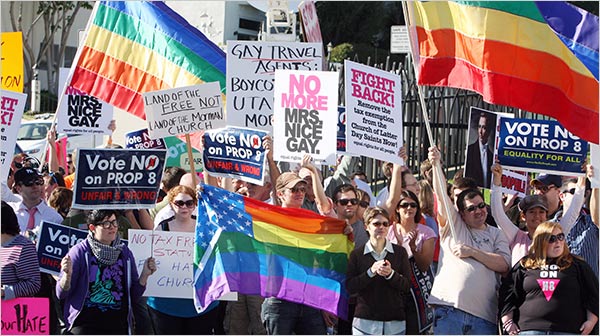
Ninth Circuit Holds Proposition 8 Unconstitutionally Discriminates Against Gays and Lesbians
- February 8, 2012
- David Levy
- No comments
Yesterday, in Perry v. Brown, the U.S. Ninth Circuit Court of Appeals declared unconstitutional Proposition 8, which took away the rights of gays and lesbians to use the designation of “marriage” to describe their committed relationships and, thus, deprived them of the status and dignity of those relationships.
The 9th Circuit concluded that Proposition 8 violated the Equal Protection Clause of the United States Constitution because it singled out same-sex couples for unequal treatment by rescinding from them alone a right—even if it was not a Constitutional right—without a legitimate reason. The Court concluded that there was no legitimate reason largely because Proposition 8 merely took from gays and lesbians the designation of “marriage” and left intact all of the substantive rights and responsibilities of same-sex partners. Therefore, the court found that it did not promote any of the reasons advanced by the advocates of Proposition 8 (i.e., to promote childrearing by biological parents, to encourage responsible procreation, to proceed with caution in social change, to protect religious liberties, or to control the education of schoolchildren).
Because it held that there was no legitimate governmental interest in prohibiting same-sex marriages, the 9th Circuit inferred that Proposition 8 was enacted only with the constitutionally illegitimate basis of animus toward or disapproval of gays and lesbians.
It is noteworthy that the opinion seemed to be targeted at Justice Anthony Kennedy who would likely be the swing vote if the case is appealed to the United States Supreme Court. The decision relied heavily on the Supreme Court’s 1996 opinion in Romer v. Evans in which Justice Kennedy, writing for the Court, found an amendment to the Colorado Constitution violated the Equal Protection Clause because it was born of animosity towards gays and lesbians and lacked a rational relationship to legitimate state interests.
Many commentators argue that Perry v. Brown will have no impact outside of California. I disagree. While it is true that the Court did not find that there is a fundamental right to same-sex marriage (because it did not need to address the issue), it did find that gays and lesbians cannot be stripped of existing rights to marriage equality. To the extent that another state attempts to rescind any rights of gays and lesbians, including the right to marry, without a legitimate reason, the 9th Circuit’s decision would seem to apply.
